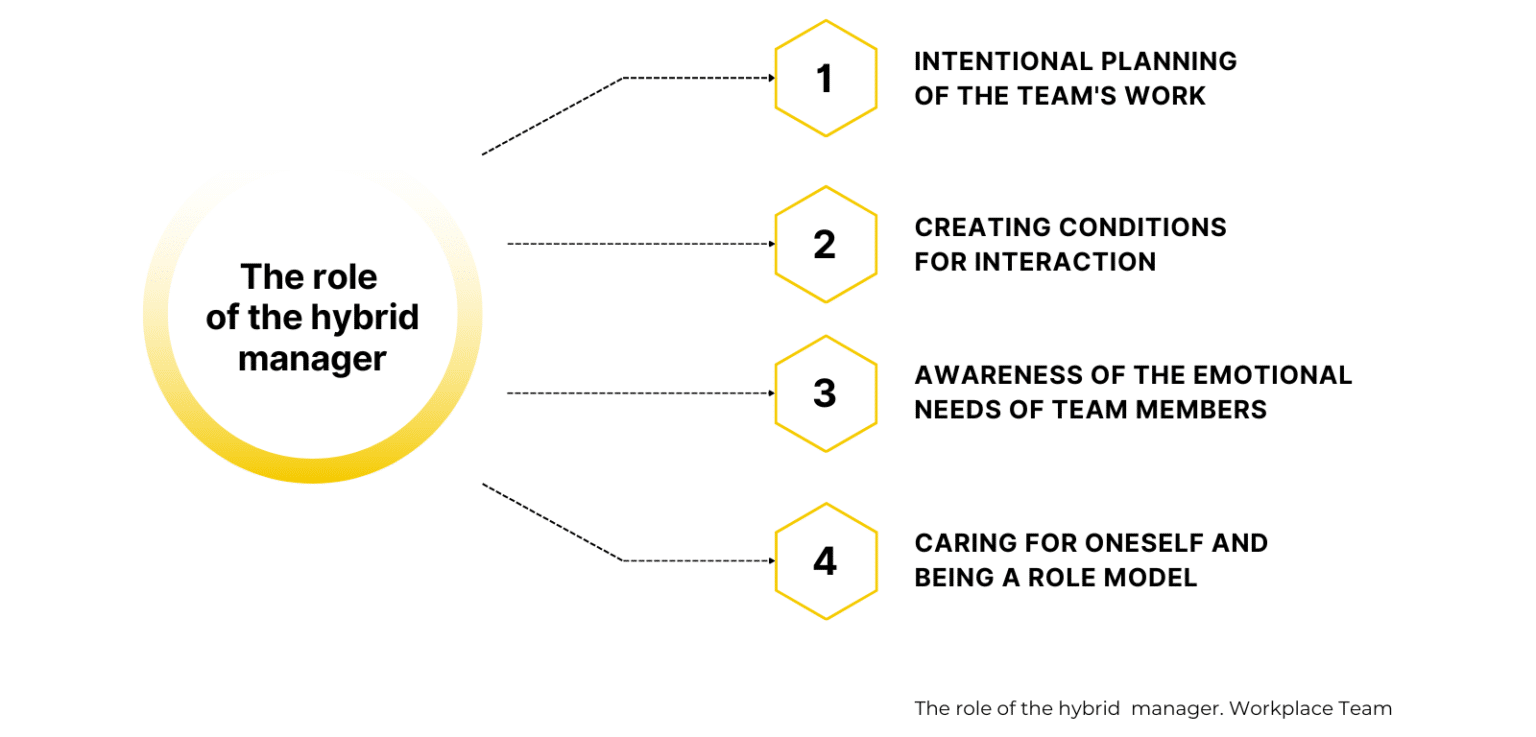
The New Role of the Manager in a Hybrid Reality
During the pandemic, businesses experienced a revolution in the scope of their work model. No one has any doubt that hybrid work is here to stay and its effective management is a genuine challenge for managers. What is the role of the manager in the new hybrid reality? What are his/her challenges and how can he/she overcome them? Let us have a look at four areas to nurture when managing a hybrid team.
The manager is now a connection point for people, organisations, and functioning systems. So far, regardless of the type of a given company, the manager’s function covered the following roles: decision-making, interpersonal, and communication. Hybrid work has changed the specificity of the way teams function, which in turn strongly redefines the role of the manager. Undoubtedly, the modern manager in his/her everyday work needs to draw attention to new features and develop new competencies in order to maintain efficiency and employee satisfaction.
At present, the most frequently applied model is hybrid work and its effective implementation constitutes a real challenge for the management of companies.
The most frequent challenges for the hybrid manager
A new reality is being created at this very moment. A time of testing hybrid work in different versions is a time of many challenges encountered by managers who want to structure the rules of work and the way their teams operate. During meetings and interviews which we carry out with managers throughout workplace projects, we hear that they are facing the following challenges:
⚬ employees coming to the office without coordination with their team – failing to meet with people with whom they would like to cooperate,
⚬ lack of employees’ understanding the need of being present in the office (“they come only to spend time on videoconferences”),
⚬ lack of possibility to exchange information, knowledge and learn within the team,
⚬ difficulty in controlling, and monitoring the employees’ work,
⚬ low level of employee identification with the company/employer,
⚬ difficulty with monitoring employee moods and motivation,
⚬ fear of losing productivity when returning to the office or employee churn.
The new role of the hybrid team manager – 4 areas
The role of a hybrid team manager has changed with regard to the former methods of managing teams that used to meet face-to-face in the office. The office of times gone was a place where routines flourished, team meetings were held, spontaneous meetings occurred, there was a chance for an unplanned conversation with the manager, common meals or team integration. Today, it is necessary to care for these areas once again, but in a completely new way.
Our experience of working with companies that have introduced the hybrid model indicates four areas to which people managing teams should pay particular attention. These are:
- Intentional planning of the team’s work.
- Creating conditions for interaction within the team and between teams.
- Awareness of the emotional needs of team members.
- Caring for oneself and being a role model.

Intentional planning of the team’s work
A challenge associated with the hybrid work model is the appropriate management of time and work organisation. According to Karina Kiwert and Anna Walecka, this depends both on the employee and the employer and naturally, all rests on the manager. One should view the work of a hybrid team through the prism of tasks, efficiency and place of task realisation. The current role of the manager is to intentionally plan the work of his/her team.
Teams that have already worked agile find it easier to organise hybrid and remote work. In order to organise the team better, it is recommended to include three aspects. First, it is worthwhile creating rituals/habits, i.e. something that is characteristic to the given team, e.g. regular Monday meetings or celebrating “failure”, in other words, a day for “lessons learned”. Second, working from the office must serve a defined purpose. There is absolutely no point in coming to the office for the sake of physical presence. Third, it is key to communicate within the team what particular members are working on and where this is done. This is best achieved through generally available schedules/timetables.
It is best to look at the work of a hybrid team through the prism of tasks, efficiency and the place of task realisation.
Creating conditions for interaction within the team and between teams
Interactions within the team or between departments have become significantly stretched thin through frequently asynchronous hybrid work deprived of spontaneous meetings in the office. Today, in order for meetings and interactions to happen, these must be intentional. And it is the manager who should create conditions for internal interactions, those with other teams or departments, to encourage people to meet, create an atmosphere for information exchange, and for people to “collide”. Here, we are talking of complete teams being formed as well as group processes. All this needs to be planned. Should this not happen, the silos effect can become exacerbated – the manager may have a well-functioning own team, but of limited contact with other teams or departments.
Awareness of the emotional needs of team members
Two years of the pandemic have changed both the employees and managers. In many instances as a result of less frequent direct interactions, the knowledge about other people is incomplete or even non-existent. What can a manager know about a person who has his/her camera off on Zoom or Teams … There is an enormous need for direct interaction of the manager with the employee and vice versa. It is not a rare case that when a manager is concentrated on a task or goal, he/she is unaware of that need. Feedback that includes both parties as well as “looking into the human being” are absolutely essential at present.
Barbara A. Manko and Jerzy Rosinski in an International Journal of Business Management publication drew attention to the fact that awareness of the emotional needs of team members is one of the key factors influencing the success of remote work. The same goes for hybrid. A subsequent key issue is the knowledge of how to address such needs. It is important to have managers trained in this area. When a manager is aware of what is going on with particular team members, he/she will react earlier and avoid unnecessary crisis situations and ensure an appropriate level of employee well-being.
Caring for oneself and being a role model
Gallup’s research of August 2022 indicates that 44% of employees underwent significant stress, and showed a low level of engagement. Therefore, managers need to listen to employee needs, be better coaches and cooperate more closely. This will not happen if they do not care for themselves. One needs to remember that the manager is like a standard to which the employee refers. He/she is a role model, whose values, attitudes and behaviours set the standards regarding what he/she may expect from others. What is needed is a satisfied manager who will focus the team, and lead it toward a common goal by creating appropriate conditions.
The Manager is a role model, whoes values, attitudes and behaviours set the standards regarding what he/she may expect from his/her employees.
The role of a hybrid team manager is an absolutely new role, which comprises many new competencies and skills. It is crucial for managers to be trained in coping with these areas and receive appropriate tools to support them. The lack of support, knowledge, and possibility of exchanging experience regarding the best practice of leading hybrid teams may negatively impact employee efficiency and well-being, the managers’ effectiveness, and realising company goals.
Should you require support regarding implementing a new model of work, please acquaint yourself with our workplace services.
Sources:
Kiwert, K., & Walecka, A. (2022). Challenges and problems of hybrid work: employees’ perspective. Journal of Management and Financial Sciences, (45), 27-48. Retrieved from https://econjournals.sgh.waw.pl/JMFS/article/view/2972
Manko, B.A. I Rosinski, J. (2015). Success Factors In Managing Remote Work: A Global Perspective. Scientific Quarterly Organization And Management, 1(53), Doi: 10.29119/1899-6116.2021.53.4
Gallup Report: State of the Global Workplace https://www.gallup.com/workplace/349484/state-of-the-global-workplace-2022-report.aspx#ite-393218



